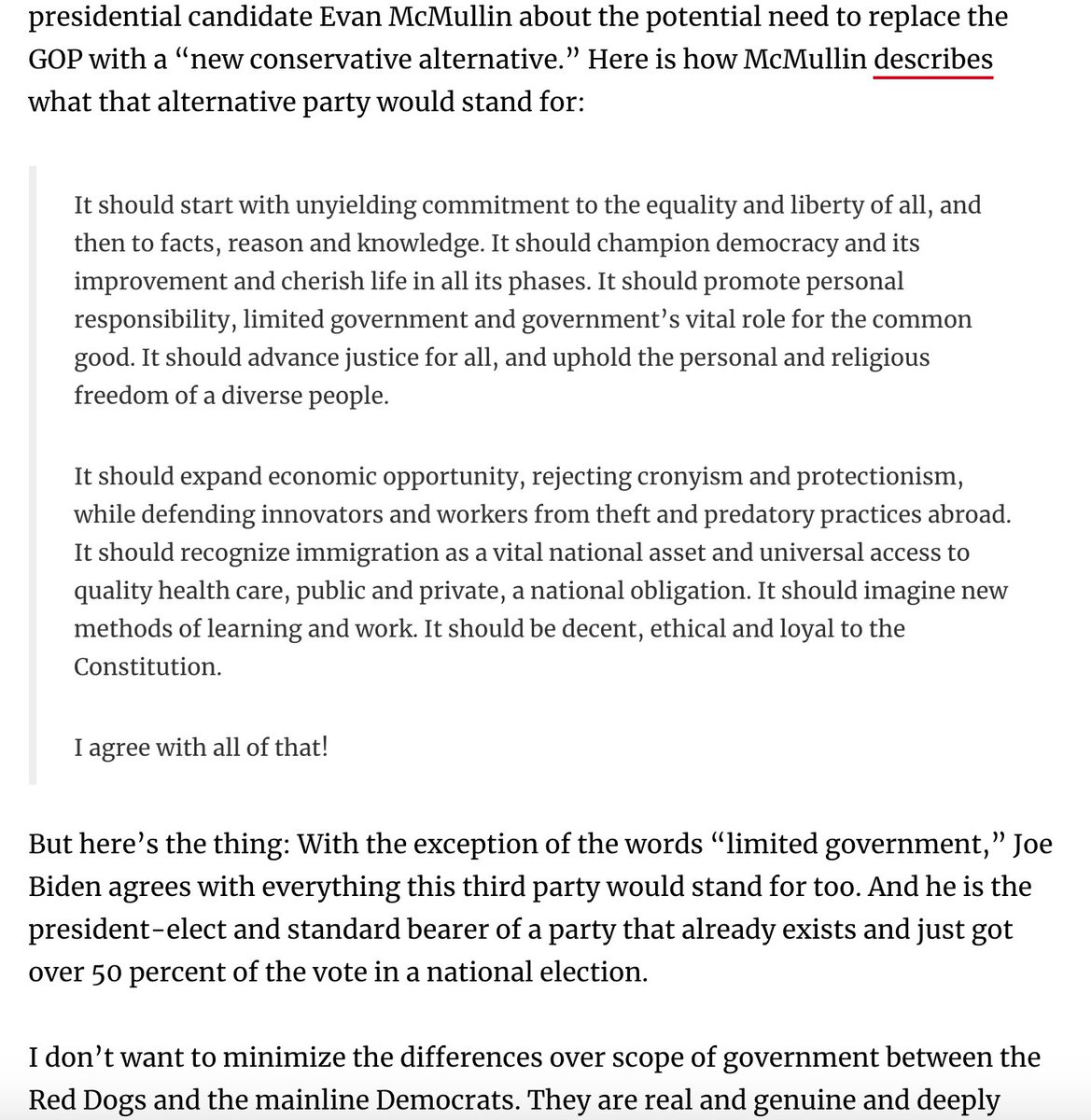If you haven't already read it, this is a very good piece and I highly recommend it. There is a lot in here that I agree with. Democrats & Republicans do need to accept that their coalitions have changed somewhat, at least at the margin. 1/ https://twitter.com/Timodc/status/1341026153352466432
That said, I think Miller tends to conflate 2 distinct groups of voters: 1) Anti-Trumpers who deeply believe in conservatism (people like Romney, Flake, David French) & 2) moderates who may have voted Republican in the past but aren't super fixed/entrenched ideologically. 2/
Here's how Miller first describes the Republican-to-Democrat voters he calls "Red Dogs": "[C]ollege-educated, largely white suburbanites in major metropolitan areas who used to be Republicans or swing voters," but now vote for Dems in national races. 3/
Miller seems to view this as a group that is basically fine with things changing in either the right or the left direction, provided they don't change too far (and I agree with that characterization): 4/
But then the conflation -- in my view a dubious one -- occurs, in the following passage quoting Evan McMullin: 5/
Miller believes that McMullin is a potential "Red Dog." I disagree, because I respectfully believe Miller seriously errs in stating that "[w]ith the exception of the words 'limited government,' Joe Biden agrees with everything [McMullin's ideal] third party would stand for." 6/
True, at a very abstract level, Biden likely agrees with most of what McMullin says. No one disagrees, for instance, that being "loyal to the Constitution" is important. But that simple phrase hides a deep & fractious dispute between GOP & Dems... https://twitter.com/EvanMcMullin/status/826600442612371457 7/
What *constitutes* loyalty to the Constitution? The dispute is so intense that a SCOTUS nominee can be praised by one party as a defender of the Constitution while at the same time being savaged by the other party as supporting "evil" & "tyranny." https://twitter.com/SenJohnMcCain/status/1016513307405111297 8/
Likewise, all agree that it's important to "uphold ... personal and religious freedom," but there are *big* differences in how to apply those principles (see Masterpiece Cakeshop, Little Sisters of the Poor, etc.). McMullin & Biden probably have major disagreements there. 9/
It's hard to be part of a party if you disagree with it on a wedge issue. It's not impossible -- the existence of a large number of pro-life Democrats & pro-choice Republicans shows that. 10/ https://www.pewresearch.org/fact-tank/2020/06/18/three-in-ten-or-more-democrats-and-republicans-dont-agree-with-their-party-on-abortion/
And as to judges, 3 red-state Democratic senators voted for Gorsuch (who McMullin, like nearly all conservatives, supported), so supporting conservative judges is not strictly incompatible with being a Democrat. Still, it's got to cause some serious cognitive dissonance! 11/
Anyway, bottom line, I don't think it's accurate to say that the political philosophy McMullin adheres to is particularly similar to Biden's. There's a reason Mitt Romney, Jeff Flake, and David French appear to have displayed little interest in becoming Democrats. 12/
So, yes, certain moderate ex-Republican voters may find a nice home as Democrats. But it's important not to overstate the level of agreement between Democrats & a *different* group--lifelong committed conservatives, the type of people who read Goldwater or cheered Reagan. 13/
This recent article about @monacharen comes to mind: "And just where is the permanent ideological home for a Reagan Republican like Charen in 2020? I’m not sure it’s with mainstream Democrats." 14/ https://www.theatlantic.com/politics/archive/2020/11/bulwark-never-trump-republicans-biden/617025/.
I'm told there used to be such a thing as conservative Democrats & liberal Republicans. Those phrases feel like oxymorons now. There are arguably some examples (think Joe Manchin, John Bel Edwards, Susan Collins, Charlie Baker). But it's rare. Polarization is incredibly high. 15/
(If you showed up at a College Democrats meeting and said, "I'm a Democrat but I support Trump's SCOTUS appointments," you probably would get some strange looks. Likewise if you came to a College Republicans meeting & proclaimed that you're a pro-Green New Deal Republican.) 16/
Now, maybe if they had to pick one of two options -- become a Democrat or stay a Republican -- the Democrats are indeed slightly more attractive to people like Charen. At least they deal in a largely shared set of facts, unlike the GOP (which is awash in conspiracy theories). 17/
And if you believe anyone who supported Trump displayed a disqualifying degree of poor judgment, then you may find it impossible to vote for nearly any Republican anytime soon (given how much of the party supported Trump): https://twitter.com/BillKristol/status/1341585451518464000?s=20. 18/
But there are trade-offs, & I believe Miller considerably understates the difficulty of being a modern conservative Democrat. Why the perceived need to choose one party or the other? I agree w/ him that 3rd parties are difficult to create. So I doubt that's the right path. 19/
But there is another obvious way: become an independent. Such voters could vote for Dems in some major races, but they're better off viewing themselves as independents (or even Republican-leaners) who will also vote GOP in many races, based on specific candidates & context. 20/
I get that there's a certain allure to being on a "team," picking a side. But sometimes that's not the best choice. Sometimes being an independent is the best option. You don't have to accept the "trade," because nobody has the power to trade you. https://twitter.com/BillKristol/status/1341011830001512448 /end

 Read on Twitter
Read on Twitter



